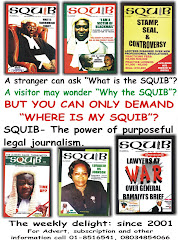THE LEARNED SQUIB
At the Ikeja High Court premises and appurtenances, I fancy to think that I am a fairly regular face. Last week, I was however rather scarce on the Ikeja High Court circuit. The 'scarcity' was caused by a number of reasons; one of which was that I had (underline, had) to find my way to Abuja on Tuesday 22nd April 2008. Until very late I didn’t know I had to go but go all the same I had to, even if one had to rob a corpse to raise funds for travel.
It was an irresistible call- not the call of nature, not the call of God, probably the call of destiny. If you are a boat-rocker, it is your fate certainly, that you’ll face trials, temptations also, and don’t you think ‘persecutions’ will fit the list?
I went necessarily to Abuja last week to face trial, trial before the Legal Practitioners Disciplinary Committee of the Body of Benchers. For the first time ever in five years, I went alone.
My friends and followers alike were not there. Even my all-weather Dad, Daddy 3 was not there – for the singular reason of the shortness of the notice, for the respondent ( a polite name and soft alias for an accused or sinner…..) my good self, to show up in Abuja for my trial.
Of course, I missed Dad’s presence on that journey. G.O.K is always talking sense, talking history, talking ethics, talking standards, teaching values. At the mundane level he will even buy one snacks and the like and who can blame one for basking in the refulgence of the titan’s glow when he is around one?
When I got to the court, a special court where a legal masquerade may go into and emerge without his wig, grown, bib and his esquire title, I saw the bar. You see, every court must have a bar and this special court has one.
The special bar of this special court has two unique features. One, the bar is located on the corridor that leads to the court outside the court room and it is so strategically placed that the gentlemen of the bar are so glaringly presented to the passing world! As different people go to and fro their different ways right in front of the bar, they see the bar and its members.
The second peculiar feature is that it is a bar without distinction. There is no inner bar there. The bar accommodates all classes of lawyers. It is one (un)happy bar.
I call it an unhappy bar, because that’s what that bar really is. The bar men often look sad, cowed and hushed. There is, always, hanging around most of them, an air of painful expectancy – that it would soon be their turn to proceed to Golgotha!
In his element, a lawyer is a handsome specimen to behold, confident expressive, assertive demonstrative, bubbling with life. But in the special bar, which I call the “Sinners Row,” the spunk is gone out most of the members therein.
So what you see in their faces, carriage and body language, is worry, confusion, anxiety and barely- disguised terror. It is like sitting for the examination of one’s very life before a capricious and arbitrary examiner. At least, this what appears to me be the perception of most of the men of the special bar.
The last time I was there, I was about the only ‘sinner’ in that infamous row with any glow. To dispel despair and peel away the pervading chill, I had strolled out of the bar and procured some soft drinks and newspapers which I distributed to my colleagues in tribulation. I noticed that virtually everybody was shocked at my action. The generosity was appreciated but the timing gave my folks the jiminies.
Can’t blame them I say – some were so far gone with terror that they feared that they would be confronted by the authorities with additional charges of misconduct, if seen enjoying light refreshments…. while waiting for Golgotha!












